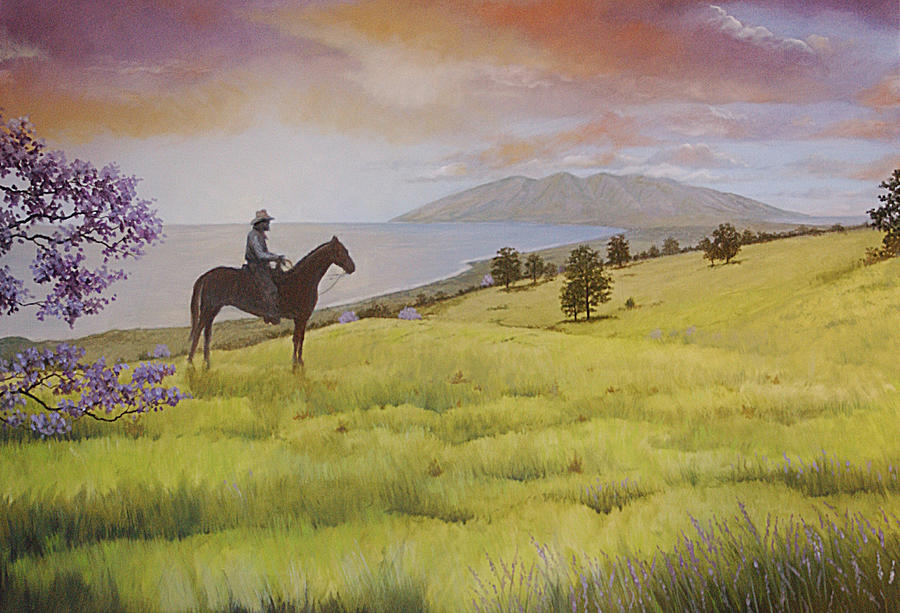
By Dany Mitzman
Appeared in BBC News
Hawaii’s cowboys, or paniolo, date back to 1798 and their modern-day equivalents are trying to preserve the tradition. But are they a dying breed?
We usually associate cowboys with American states like Texas, California and New Mexico, but Hawaii has its own strong cowboy tradition dating back more than 200 years. It is a tradition Hawaii’s older cowboys are trying their best to preserve.
It all began in 1798 with a gift of cows from Captain George Vancouver to King Kamehameha I. They thrived so well that the fertile land was soon overrun with wild cattle. Not knowing how to deal with them, the Hawaiians called in the experts – Mexican vaqueros, or cowboys.
They came to the islands and taught the natives their herding skills, and became known locally as paniolo – the Hawaiian pronunciation of espaniolos, or the Spaniards.
The heart of paniolo country is in the north of Hawaii’s Big Island. Drive just 20 minutes up the road from sandy beaches and palm trees, and the landscape transforms into rolling green hills dotted with grazing cattle, more reminiscent of Switzerland.
It is here you will find Hawaii’s most traditional paniolo town, Waimea (also called Kamuela), where the cowboy heritage is so strong even the stop signs say “Whoa”.
The little town is home to Parker Ranch, once the largest privately owned ranch in the US. It’s named after John Palmer Parker, the first man trusted by King Kamehameha I to shoot wild cattle. He went on to marry the king’s granddaughter, Kipikane, and was given two acres of land and permission to wrangle the wild cows. Parker Ranch was founded in 1847, thus beginning the island’s ranching tradition.
The 130,000 acre ranch now has just 12 cowboys. Sonny Keakealani Jr, who started working there in the 1970s, is retired but says you never really stop being a cowboy. Living across the road from the main entrance, he still helps to break in young horses and branding cows.
“I remember a time when there were more cowboys on horses than cars driving along this road,” reminisces Sonny, whose father, uncles, grandfather and great-grandfather were all paniolo.
“We used to go to the paniolo diner for breakfast at 2.30am before we went out herding cattle all day.”
Sonny recently won a lifetime achievement award from the Paniolo Preservation Society for his outstanding services to the Hawaiian cowboy heritage. He has been recognised for mentoring proteges and sharing skills and know-how about every aspect of paniolo culture, from saddles and gear to language, traditions, place names and legends.
He admits the nature of the work and low salaries do little to attract young people, but hopes his passion for the lifestyle and daily contact with nature can convince them that the sacrifices are worthwhile.
“Being a cowboy isn’t easy, the paniolo lifestyle is rough and hard. You just gotta have it in your heart. You have to have the guts and know-how but you gotta love it.”
Sonny Keakealani’s three children started riding horses when they were toddlers.
“I’m proud. I raised my children as paniolo,” he says.
One of Sonny’s daughters now works at Parker Ranch and he hopes some of his grandchildren will follow the same path. He believes it is vital for the paniolo families to take responsibility for keeping the flame alive.
“Many of the paniolos you see today are from several generations of families that lived here in the islands and worked on family ranches,” says Danny Akaka Jr, a cultural specialist on the Big Island.
Paniolo culture is a much-loved and respected part of Hawaiian heritage, with cowboy songs often performed on the ukulele, and paniolo steaks and burgers popular favourites on restaurant menus. Even so, Danny Akaka has seen paniolo numbers drop significantly in recent years.
“In some cases one member of the family might remain on the ranch and work with their parents, while others leave and just come home to visit. The ranching traditions are still carried on although times are tough. Beef prices have dropped and it is hard to make a living off ranching alone now. Many have other jobs to supplement their income with ranching as just a side job.”
But Sonny Keakealani Jr hopes that the young cowboys he mentors will continue to enjoy the cowboy lifestyle.
“The paniolo community is like a family – in Hawaiian we say ‘ohana’. You get together and everybody’s involved like a family. We had Japanese, Portuguese, Filipinos… all the immigrants that came to Hawaii got involved as paniolos. They understood and used the Hawaiian language, even if they didn’t speak it fluently. Everybody loved horses and loved to work cattle. It really is like one happy family.”
